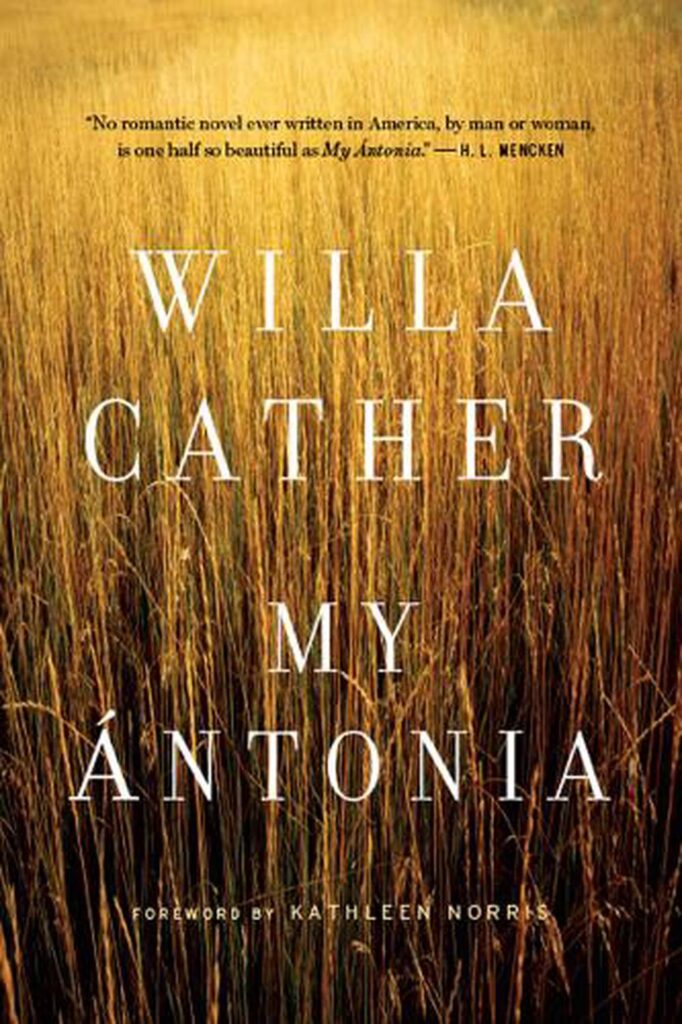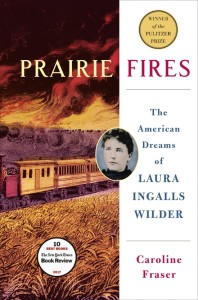
Suspecting we might need a reason to feel good about our country, one of my book clubs selected this well-known novel. It turned out to be an inspired choice (thank you, Pamela!). Published in 1918, most of the story takes place in the 1880s in Black Hawk, Nebraska, based on the tiny town of Red Cloud where Cather grew up.
After a prologue, the story is narrated by Jim Burden, who—like Cather—moved from Virginia to Nebraska. Unlike the author, though, his parents have died, and 10-year-old Jim goes to live with his grandparents. On the train he meets the Shimerda family, newly arrived from Bohemia and planning to homestead outside Black Hawk. He and their oldest daughter Ántonia immediately become friends.
It is still the early days of pioneers on the vast plains. While some, such as Jim’s grandparents, are finally making a living from the land, others must start from scratch. The Shimerda’s land turns out to have only a rough cave in the earth for a home and land that is mostly unbroken prairie. Near neighbors and somewhat isolated from town, Jim and Ántonia’s friendship grows.
The time and place come alive through their adventures in this picaresque story—tragedies, successes, hard work, plenty of play—and through the characters of Jim, described as “romantic and ardent” by another character, and Ántonia who is near bursting with joy in being alive. She reminds me of Lucinda Matlock from Edgar Lee Masters’ Spoon River Anthology: “It takes life to love life!”
Cather’s prose fills me with delight. Appropriately for the setting and characters, it is both clear and rich. It’s plain enough for young readers, yet there are layers of complexity for adults to appreciate. She sets the pace for the story right away, in the prologue. We are on a train. We will get there when we get there. You can’t hurry it along, so relax and look out the windows:
While the train flashed through never-ending miles of ripe wheat, by country towns and bright-flowered pastures and oak groves wilting in the sun, we sat in the observation car, where the woodwork was hot to the touch and red dust lay deep over everything. The dust and heat, the burning wind, reminded us of many things. We were talking about what it is like to spend one’s childhood in little towns like these, buried in wheat and corn, under stimulating extremes of climate: burning summers when the world lies green and billowy beneath a brilliant sky, when one is fairly stifled in vegetation, in the color and smell of strong weeds and heavy harvests; blustery winters with little snow, when the whole country is stripped bare and gray as sheet-iron. We agreed that no one who had not grown up in a little prairie town could know anything about it. It was a kind of freemasonry, we said.
From this encounter between a middle-aged Jim and a former neighbor, we move into Jim’s account of his youth. Some of it strikes us, more than a hundred years on, as problematic: the treatment of the few Black characters, the sod-breaking that we now know will yield only a few good harvests before blowing away in Dust Bowl storms.
But what does come through, and became such a balm to us, are the virtues of these two characters: Ántonia’s life force and Jim’s passionate loyalty to friends, family and country. Even more, though, it is how the inevitable tensions and prejudices of people who have been thrown together are overwhelmed by the need to work together. Best of all is the way they, without hesitation, give unstintingly to neighbors when they need help.
As happens in the best novels, Cather signals these tensions on the first page.
Once when he [Jake, the farmhand who’d been sent to accompany Jim to Nebraska] sat down to chat, he told us that in the immigrant car ahead there was a family from ‘across the water’ whose destination was the same as ours.
‘They can’t any of them speak English, except one little girl, and all she can say is “We go Black Hawk, Nebraska.” She’s not much older than you, twelve or thirteen, maybe, and she’s as bright as a new dollar. Don’t you want to go ahead and see her, Jimmy? She’s got the pretty brown eyes, too!’
This last remark made me bashful, and I shook my head and settled down to ‘Jesse James.’ Jake nodded at me approvingly and said you were likely to get diseases from foreigners.
Later in the story, we see divisions between the Catholics and Protestants, and between the “town girls” and the “country girls” who were often from immigrant families. But these distinctions were forgotten when an untimely death, a fire or a blizzard struck.
I was also impressed by Cather’s capsule descriptions of characters. Here is how she introduces Jim’s grandparents (in Jim’s voice):
She was a spare, tall woman, a little stooped, and she was apt to carry her head thrust forward in an attitude of attention, as if she were looking at something, or listening to something, far away. As I grew older, I came to believe that it was only because she was so often thinking of things that were far away. She was quick-footed and energetic in all her movements. Her voice was high and rather shrill, and she often spoke with an anxious inflection, for she was exceedingly desirous that everything should go with due order and decorum. Her laugh, too, was high, and perhaps a little strident, but there was a lively intelligence in it. She was then fifty-five years old, a strong woman, of unusual endurance . . .
My grandfather said little. When he first came in he kissed me and spoke kindly to me, but he was not demonstrative. I felt at once his deliberateness and personal dignity, and was a little in awe of him. The thing one immediately noticed about him was his beautiful, crinkly, snow-white beard. I once heard a missionary say it was like the beard of an Arabian sheik. His bald crown only made it more impressive.
Grandfather’s eyes were not at all like those of an old man; they were bright blue, and had a fresh, frosty sparkle. His teeth were white and regular—so sound that he had never been to a dentist in his life. He had a delicate skin, easily roughened by sun and wind. When he was a young man his hair and beard were red; his eyebrows were still coppery.
We get a sense of how they look and of their distinct personalities. If you haven’t read this classic novel, or only long ago, try it out. You might find, as we did, a portrait of what is best about this country, what we can achieve when we remember that we are not just individuals, but members of a community.
What classic novel have you reread? How did it hold up?
